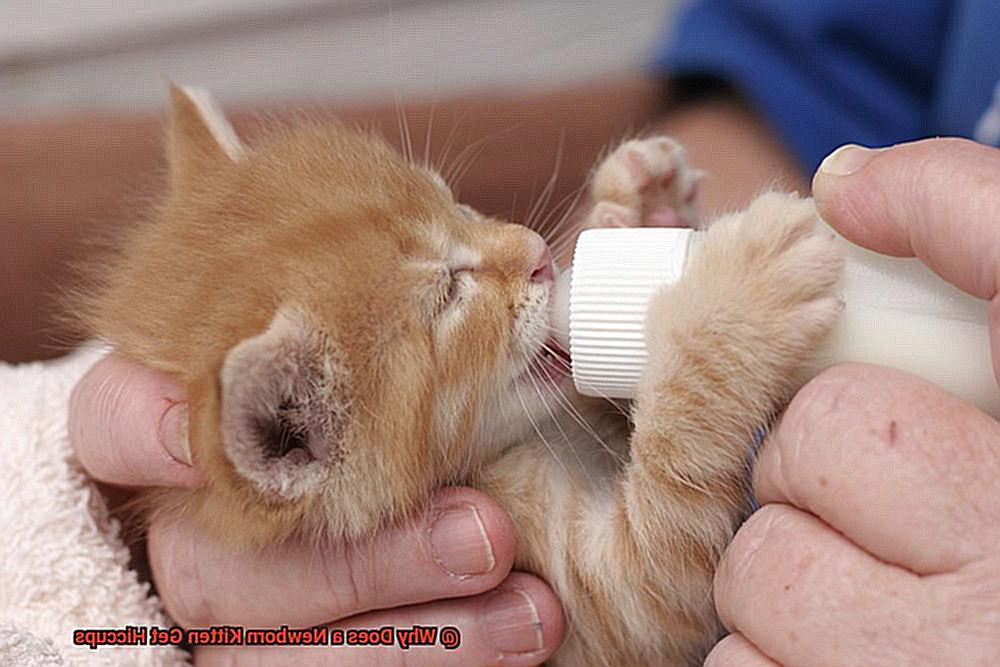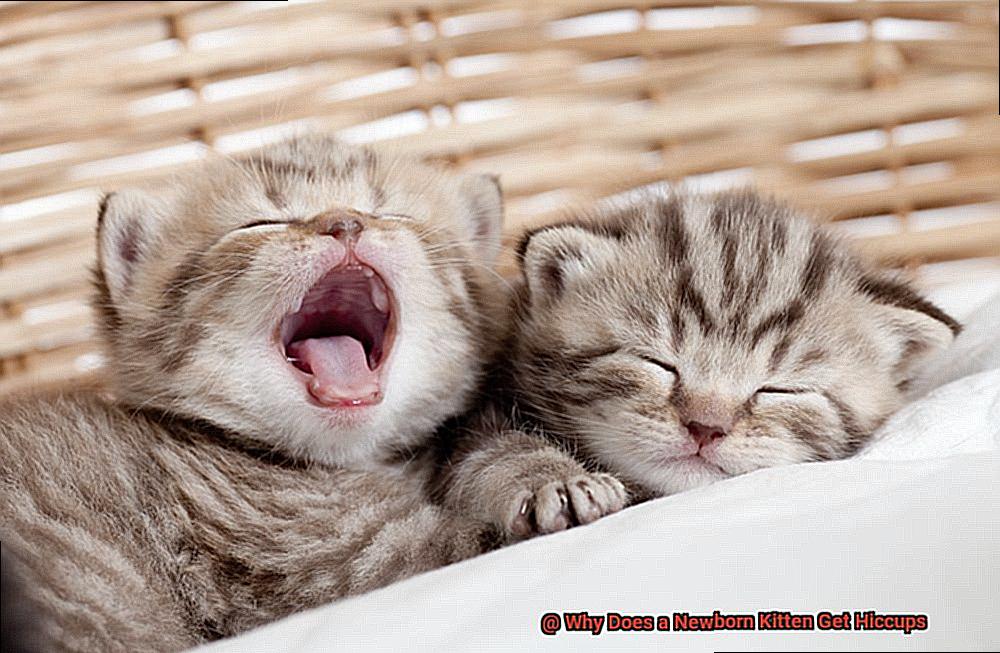Have you ever heard a newborn kitten scream? It’s a strange sound that can be disconcerting, but there are some fascinating explanations for why this happens.
In this blog post, we’ll explore the science behind kitten hiccups. We’ll look at the physiological reasons and find out how to comfort your furry friend during an episode.
So let’s uncover the mystery of why kittens get hiccups and learn how to support them through it.
Is It Normal For Kittens To Have Hiccups?
Hiccups are a common occurrence in newborn kittens and are usually harmless. They can be caused by excitement, eating too much or drinking too quickly, or even stress.
Kittens may also experience hiccups if they swallow too much air while nursing.
Hiccups in kittens can last anywhere from a few seconds to several minutes and may happen multiple times a day.
It is important to remember that hiccups are not usually a sign of an underlying health issue and should not cause concern.
In most cases, the little ones will outgrow them as they get older.
Do Newborn Kittens Get Hiccups?
Just like humans, kittens can experience hiccups when their diaphragm is irritated or stimulated. Stress, excitement, or even overfeeding can be the cause of these hiccups.
While they may seem concerning, hiccups in newborn kittens are usually harmless and should not be a cause for alarm.

However, if your kitten has frequent bouts of hiccups, it could be an indication of an underlying medical condition that requires veterinary attention.
Why Does a Newborn Kitten Get Hiccups?
The cause of this phenomenon is the immaturity of their diaphragm, the muscle that separates the chest and abdomen.
Sudden contractions of this muscle can be triggered by a variety of things, such as eating too quickly or even excitement. This causes the kitten to take in a quick breath of air and then exhale it suddenly, resulting in hiccups.
Fortunately, these hiccups are usually nothing to worry about and will usually go away on their own within minutes. However, if your kitten has persistent or frequent hiccups, it’s best to consult your veterinarian for advice and possible treatment options.

So the next time your little one gets the hiccups, don’t fret – it’s just their immature diaphragm causing them a bit of trouble.
What Causes Newborn Kitten Hiccups?
You may have noticed that they occasionally hiccup. But what causes these hiccups?
The most common cause of hiccups in newborn kittens is due to a spasm of the diaphragm, which is triggered by a sudden intake of air. This can happen if the kitten eats or drinks too quickly, or even if they are new to it.
An immature digestive system can also cause kittens to swallow too much air when they are nursing or drinking from their bottle.
Kittens’ nervous systems are still developing, so they may have difficulty controlling the muscles in their diaphragm and thus experience hiccups more easily than older cats. Furthermore, stress and anxiety can cause kittens to hiccup.
If your kitten is hiccupping often, try to minimize any stressors in their environment such as loud noises, new people or animals entering the house.
Hiccups in newborn kittens may be cute and harmless, but it’s still important to pay attention to them because they could be a sign of something else going on.
How To Tell If Your Kitten Has Hiccups?
Hiccups in kittens is a common occurrence that can be caused by a variety of factors, such as excitement, hunger, drinking cold water or eating cold food too quickly.
When the diaphragm, the muscle that separates the chest from the abdomen, spasms involuntarily, you may notice your kitten’s chest and abdomen rapidly rising and falling with each hiccup.
The sound associated with hiccups may vary from a single “hic” to multiple “hics” in succession.
The most obvious sign of hiccups in kittens is a repetitive diaphragm spasm. You may notice your kitten’s chest moving up and down quickly with each hiccup.
To confirm if your kitten has hiccups, you can gently place your hand on their chest and feel for the diaphragm spasms or check their breathing pattern to see if it is normal or disrupted by the hiccups.
What To Do When Your Newborn Kitten Has Hiccups?
When your newborn kitten has hiccups, it can be a worrying time for any pet parent. However, there is no need to panic. Hiccups in kittens are generally harmless and will go away on their own after a few minutes. Here are some tips on how to deal with hiccups in kittens and ensure your precious bundle of fur remains safe and healthy.
Maintain Calm
If your infant kitten has hiccups, it is essential to remain calm and not panic. In most cases, the hiccuping should stop after a few minutes and the kitten will be back to its normal self soon enough.
Gently Rub Their Chest or Back
To help relax the kitten further, you can try gently rubbing their chest or back. This may help soothe them and stop the hiccuping from continuing any further.
Give Your Kitten Something Warm To Drink
You can also give your kitten small amounts of sugar water or warm milk as this may help soothe their stomach and stop the hiccups from persisting any longer.
Contact Your Veterinarian
If the hiccups don’t stop after a few minutes, you should contact your vet for advice on how to proceed further as they may be able to provide more information on how to handle this situation properly and ensure that your kitty is safe and healthy at all times.
Monitor Your Kitten’s Wellbeing
Even if the hiccuping stops, it is still important to monitor your kitten’s health for any signs of distress or pain that could indicate an underlying medical condition that needs immediate attention from a veterinarian.
Hiccups in kittens are usually harmless, but it is still important to note any unusual behaviour or symptoms that could indicate something more serious that needs medical attention right away.
Home Remedies For Treating A Newborn Kitten’s Hiccups
Newborn kittens are so precious, but they can get hiccups too! Hiccups in kittens can be quite annoying and make them uncomfortable. Luckily, there are some home remedies that may help to soothe a newborn kitten’s hiccups.
Massaging the stomach area of your kitten is one of the most popular home remedies for hiccups. This helps to relax their diaphragm and put an end to the hiccups. However, it is important not to press too hard as this could cause more harm than good.
Another home remedy is to give the kitten some sugar water. Sugar water helps to calm them down and reduce their stress levels, which can help stop their hiccups from occurring. Just make sure not to give them too much sugar water as this could be detrimental to their health.
Providing a distraction such as playing with toys or petting your kitten can also help take their mind off the hiccups and keep them relaxed until they go away.
If you have a baby kitten who has been suffering from hiccups, these home remedies may be able to help.
When Should You Seek Professional Help For Your Kitten’s Hiccups?
It’s important to seek professional help from a veterinarian. Hiccups can be a sign of an underlying medical condition, and your vet can help diagnose and treat this. Plus, they can provide advice on how to prevent hiccups in the future.
If your kitten is having difficulty breathing or appears to be in distress due to their hiccups, you should seek medical attention immediately. Even if the hiccups aren’t severe or frequent, it’s always best to have them checked out by a specialist if possible.
Your veterinarian will be able to determine the cause of the hiccups and provide the best possible care for your beloved kitten.
Also Read: What To Feed Newborn Kittens In An Emergency?
Conclusion
In conclusion, hiccups in newborn kittens are usually harmless and will usually go away on their own.
However, if your kitten has frequent or persistent hiccups, it is best to see the vet for a checkup as this may indicate an underlying medical condition.
There are several home remedies you can try to help with a newborn kitten’s hiccups: massaging their stomach area, giving them sugar water, or providing a distraction.
And if your kitten is having trouble breathing or seems to be in pain as a result of their hiccups, seek medical attention immediately.
By following these tips, you can ensure that your precious bundle of fur remains safe and secure.







